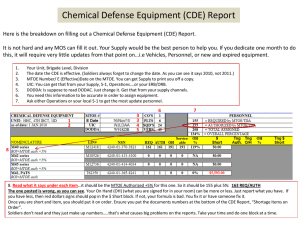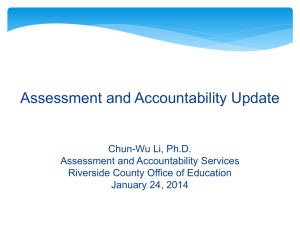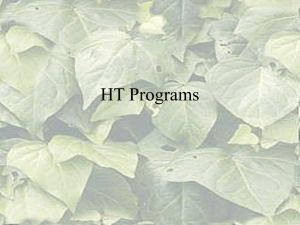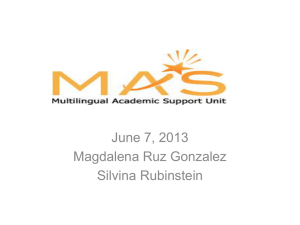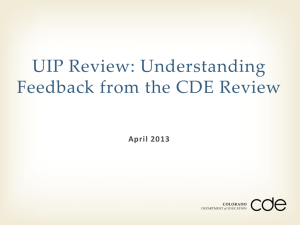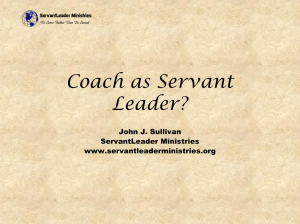Introduction - Youth Development & Agricultural Education
advertisement
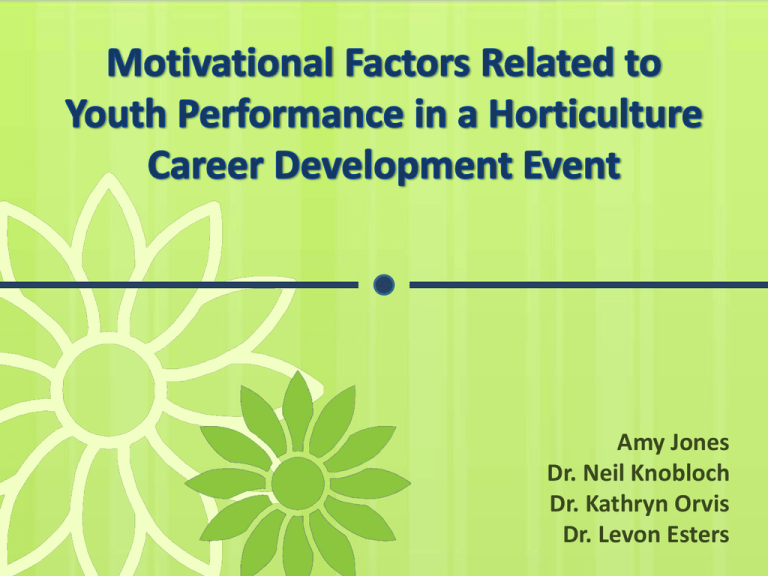
Amy Jones Dr. Neil Knobloch Dr. Kathryn Orvis Dr. Levon Esters Competition Mixed Results (Radhakrishna, 2006, Lepper & Greene, 1978; Weber & McCullers, 1986; Johnson, 1914) personal skills and goals and career development (Blakely, 1993) According to the National FFA Organization… “The role of career development events is to motivate students and encourage leadership, personal growth, citizenship and career development” (2006, p. 5) • Horticulture Industry Certification – – – – Professional Landcare Network American Society for Horticultural Sciences Botanical Gardens Indiana Nursery & Landscape Association • Horticulture Degree Programs – Approx. 54 on-campus • Horticulture Careers – Wide Variety – Various Degree Requirements The purpose of this research study was to explore youth’s… Knowledge Motivation Learning Experiences and to describe relationships between Youth Motivation Learning and Preparation Coach Motivation Youth’s Performance in a competitive out-of-school horticulture career development experience. Youth Motivation -Intrinsic Value -Utility Value -Attainment Value -Cost -Self-Efficacy Pre-CDE Educational Experiences Coach Motivation -Intrinsic Value -Utility Value -Attainment Value -Cost -Self-Efficacy Learning and Preparation -Learning Resources -Preparation Time CDE Outcomes CDE Performance -General Knowledge Exam -Identification Exam -Product Evaluation Exam • Expectancy-Value Theory Expectancies and Values • Self-Efficacy Personal beliefs achievement perseverance completion (Eccles & Wigfield, 2002) thoughts/feelings motivation behaviors (Bandura, 1994) Competition •Of the four specific organizational elements of CTSOs (leadership, community service, competitions, and professional development) competition had the most constructive effects (Alfed et. al, 2007) Youth Motivation •Six themes of how Oklahoma secondary agriculture teachers motivated their students to participate in CDEs Russell et al. (2009) •Students’ motives to participate in CDE were different than their teachers’ motives (Croom et al., 2005) Preparation •Visits to garden centers and greenhouses were the main preparation aid, followed by videos and slides, websites, textbooks, and university’s living laboratories (Poskey et. al, 2005) Performance •Demographical differences between low and high performers at a Livestock Evaluation CDE (Theiman et. al, 2010) • • • • Exploratory, descriptive study QUAN + qual Questionnaire distribution Performance – General Knowledge Exam • 80 questions (800 Points, 36%) – Identification Exam • 100 specimen (1000 Points, 45%) – Product Evaluation Exam • 8 classes (400 Points, 18%) • Youth • motivation, 28 items (Post-hoc reliability 0.64 – 0.89) • learning resources and preparation, 21 items • demographics, 5 items • Coaches • motivation for having youth participate, 29 items (Posthoc reliability 0.63 - 0.90) • learning resources used to help youth prepare, 19 items • demographics, 9 items Youth Gender (n = 57; 2 missing) Class Status Male: 51% Female: 49% Underclassmen: 54% Upperclassmen: 46% Years Participated in Hort CDE 1 Other CDEs besides Hort? 59% 2 or more 41% Yes 66% Coaches Gender (n = 6; 1 missing) Male: 50% Female: 50% Participated as youth: Yes 83% Coach description Agricultural Teacher/FFA Advisor 100% Years Coaching Hort 11.33 years (SD = 14.82) Youth were motivated to participate in a competitive horticulture career development event Youth Mean Motivation 4 3.5 3 2.5 2 1.5 1 0.5 0 3.68 3.29 3.08 3.06 2.76 *Note: Scale: 1 = None, 2 = A little, 3 = Somewhat, 4 = Quite A Lot, 5 = A Great Deal Youth were motivated to participate in a competitive horticulture career development event and youth motivation was related to performance of horticultural competencies Relationships between Youth Motivation and Youth CDE Performance CDE Performance General Product Identification Total CDE Knowledge Evaluation Exam Exam Score Exam Exam Youth Motivation Intrinsic 0.35* 0.34* 0.02 0.36* Utility 0.26 0.32* -0.04 0.30* Attainment 0.28 0.33* 0.07 0.32* Cost 0.06 0.17 0.15 0.14 Self-Efficacy 0.33* 0.33* 0.05 0.34* Note. *Practically significant = medium effect size Coaches’ motivation was related to youth motivation Relationships between Youth Motivation and Coach Motivation Coach Motivation Intrinsic Utility Attainment Cost Self-Efficacy .15 .14 .11 .14 -.08 .52** .28 .36* .05 -.23 Attainment .21 .09 .08 .09 -.03 Cost .25 .06 -.10 .12 -.05 Youth Motivation Intrinsic Utility Self-Efficacy .33* .10 .10 .05 Note. Practically significant = *medium effect size or **large effect size -.09 Coaches’ motivation was related to youth motivation and youth performance of horticulture competencies Relationships between Coach Motivation and Youth CDE Performance General Knowledge Exam Coach Motivation Intrinsic Utility Attainment CDE Performance Product Identification Evaluation Exam Exam Total CDE Exam Score .50** .48* .57** .50** -.03 -.02 .56** .51** .48* .53** -.03 .53** Cost .25 .26 .07 .26 Self-Efficacy -.39* -.57** -.07 -.53** Note. Practically significant = *medium effect size or **large effect size Time spent preparing for the horticulture career development event and learning resources used by youth were related to youth’s overall performance of horticultural competencies. Relationships between Learning Resources and Youth CDE Performance Exam General Product Identification Knowledge Evaluation Learning Resources Old Tests or Quizzes .42* .40* Flashcards .22 .31* Classroom Aids/Real.31* .36* Life Materials Preparation Time With Team .30* .31* Alone .30* .34* Total Hours .39* .43* Note. *Practically significant = medium effect size Total CDE Score -.14 -.00 .42* .29 -.06 .34* -.07 .01 .04 .32* .32* .42* However, youth did not perform horticultural competencies at a level required to be a certified horticulture manager or technician in the horticulture industry. Average Exam Scores (%) 95 100 80 60 61 63 52 40 20 0 General Knowledge Identification Product Evaluation Total CDE Score • Coaches clinic – create learning environments that • build competencies • self-efficacy – build youth’s competencies • assessment tools of the event • career and certification guidelines • Learning resources and assessments should reflect – university course requirements – industry certification programs • Due to the small population and nature of the study… • Participants and contexts – replications into events with similar contexts – replications into events with differing contexts • Measurements and impacts – coaching strategies and learning resources prior to event – preparation of youth for future careers, including STEM careers • My Family and Friends • Dr. Neil Knobloch • Dr. Kathryn Orvis • Dr. Levon Esters • Graduate Students • YDAE Thank you!

